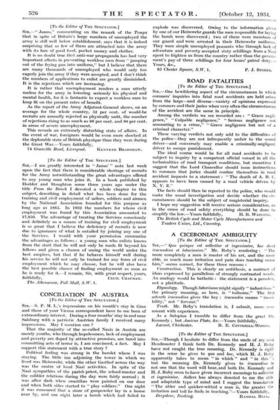A CICERONIAN AMBIGUITY
[To the Editor of THE SPECTATOR.] SIR,—” Quo quisque est sollertior et ingeniosior, hoc docet iracundius et laboriosius." Mr. Roby's rendering : ‘" The more completely a .man is master of his art, and the more able, so much more irritation and pain does teaching cause
seems correct, for these three reasons :
Construction. This is clearly an antithesis, a contrast of ideas expressed by parallelism of strongly contrasted words. An analogy would be bathetic : the statement is a paradox, not a platitude.
Etymology. Though laboriosus might signify" industrious" the primary meaning, as here, is "toilsome." The first adverb iracundius giver the key : iracundia means "irasci- bility," not " fervour." , Truth. Mr. Roby's translation is, I submit, more con- sonant with experience.
As a Salopian I tremble to differ from the great Dr. Kennedy ; but Amiens Plato, &c.—Yours faithfully,














































 Previous page
Previous page